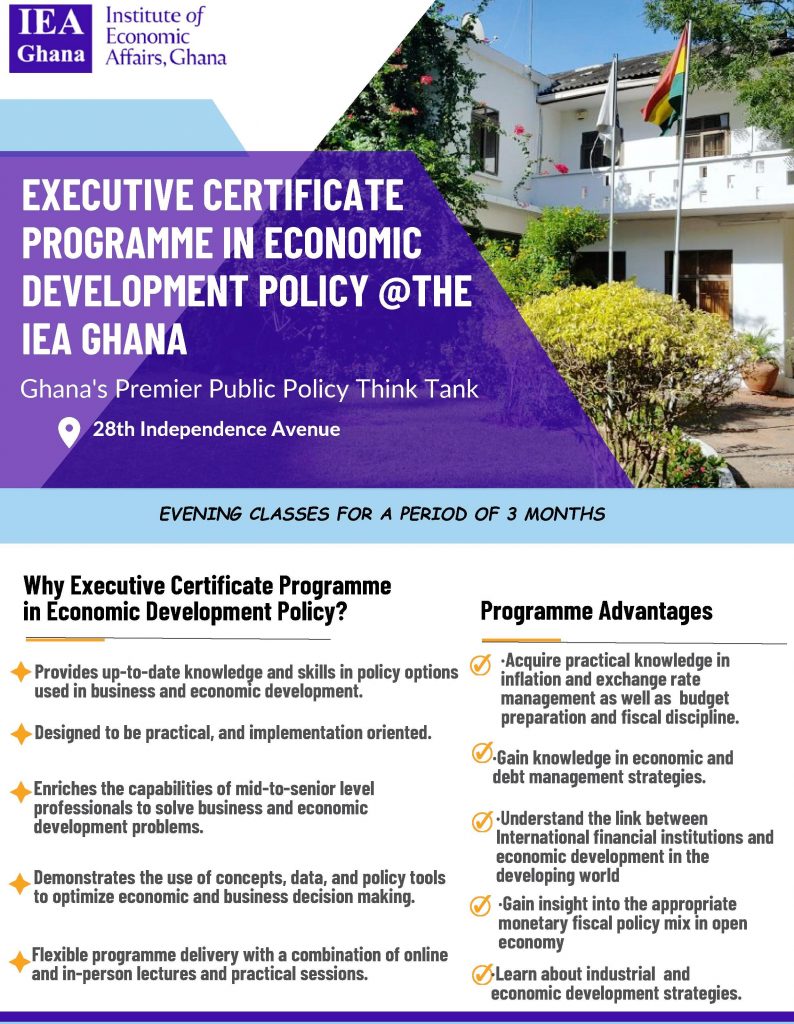Executive Certificate in Economic Development Policies and Practices

Programme Description
Economic development policies seek to promote macroeconomic stability, effective tax collection, investment in public services, agriculture productivity growth, and industrialization to increase manufactured exports. These policy decisions involve options for allocating public budgets, challenges with public revenue collection, and effective management of the levels of public deficits and debts. They also require the understanding of how fiscal and monetary policy combine in a complex global economy to achieve economic goals, industrial policies, and reduction of poverty and income inequality. Whether you are a policy maker who is directly involved in the design and implementation of economic policies, or indirectly impacted by them while working in the public sector, in private companies, or in civil society, policy professionals need to possess a solid understanding of the background and policy options used in economic development policymaking.
The Executive Certificate in Economic Development Policies and Practices is a specialized programme designed to provide participants with the necessary skills and knowledge to design, implement, evaluate, and analyse economic policies that promote business growth and overall sustainable economic growth and development. Stimulating economic development is a top priority to all nations, yet development professionals in many countries lack productive capacity and capability to solve development problems. Hence, the programme is typically aimed at mid-to-senior level government officials, policymakers, development practitioners, managers in the private sector, and representatives from civil society.
The programme is designed to be practical, and implementation oriented. Its focus is on how to use concepts, data, and policy tools in different economic policy domains to make the best possible decisions or understand how such decisions are made. The sessions are taught in a fully interactive manner by economists and policymakers with expertise and long track-records in economic policy analysis, design, and implementation. The instructors use real-life data and bring insights as well as practical hands-on knowledge to economic decision making in various policy domains. The programme is delivered through a combination of online and in-person instruction including lectures, case studies, group exercises/presentations, guest lectures, comparative analyses, and field visits. The programme is taught by senior fellows at the IEA and guest instructors from the Bank of Ghana, University of Ghana, ISSER, Ministry of Finance, and other Ministries.
The programme is offered in two parts. Part 1 focuses on macroeconomic policies for stability and development, and part 2 focuses on structural change policies for development. Participants in the programme can take only one part of the programme but it is highly recommended that they take both parts to obtain comprehensive understanding of all the building blocks and policies to achieve economic development.
Training Prerequisites
This executive training programme is taught at an intermediate/advanced level. Participants should have some familiarity with economic policy concepts and tools, including data and quantitative tools, though no expertise in these is required.
Part I: Macroeconomic Policies for Stability and Development
Learning Modules
Through five (5) separate learning modules, the first part of the programme will cover the following areas:
- Module 1: The fundamentals of managing economic development I.
- Module 2: Economic development data analysis and interpretation.
- Module 3: Fiscal policy.
- Module 4: Monetary policy.
- Module 5: Public debt management.
Duration: 10 weeks
Programme Fee: GHS. 12,000
Programme Director: Prof. Alexander Bilson Darku
Learning Outcomes:
By the end of the first part of the programme, participants will be able to understand the following:
- The nature of economic development and structural transformation.
- Budget systems and fiscal discipline.
- Revenue and tax governance.
- Monetary policies to promote macroeconomic stability.
- Debt management strategies.
- Policy implementation strategies.
- Using macroeconomic policies to promote economic growth and development.
Part II: Structural Change Policies for Development
Learning Modules
Through five (5) separate learning Modules, the second part of the programme will cover the following areas:
- Module 1: The fundamentals of managing economic development II.
- Module 2: Agricultural transformation.
- Module 3: Industrialization for economic transformation.
- Module 4: Globalization and economic development.
- Module 5: Poverty, inequality, and development.
Duration: 10 weeks
Programme Fee: GHS. 12,000
Programme Director: Prof. Alexander Bilson Darku
Learning Outcomes:
By the end of the second part of the programme, participants will be able to understand the following:
- International financial institutions and economic development in the developing world.
- Multinational companies’ activities and economic development in the developing world.
- Trade policies for today’s globalized world.
- Monetary-fiscal policies mix in open economies.
- Exchange rate policies for various exchange rate regimes.
- Poverty and income inequality reduction strategies.
- Export-oriented industrialization strategy.
- Improving agriculture productivity growth to promote agro-based rural industrialization.